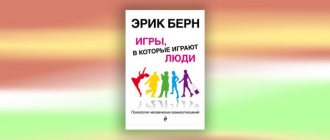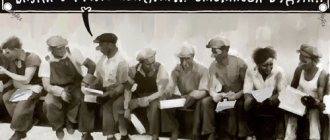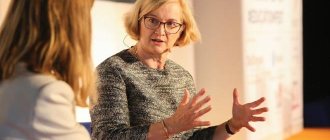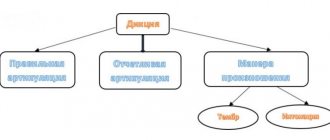To develop your own speech, to speak beautifully, interestingly and competently, you don’t have to be a philologist or linguist. Sometimes it is enough to read good fiction from time to time, which in itself instills the skills of beautiful and rich speech. However, this process is slow and must be regular, and reading a large number of books is not always possible. So if you want to give yourself an “intensive course” on improving your speech skills and not get bored, then you can turn to specialized books. If only school textbooks were as informative and varied.
Radislav Gandapas “Kama Sutra for the speaker”
The title of the book is not only a marketing ploy and a provocation. Giving the title to his work, the author proceeded from the fact that everything done with pleasure is crowned with success. Another argument in favor of this title, according to Radislav Gandapas, is that the speaker has some kind of intimate connection with the audience, and the speaker in this case must take a male position. This analogy is confirmed by the examples given in the book. The Kama Sutra for the Speaker examines important issues that arise in the process of speaking or communicating: how to cope with anxiety, how to build the outline of a speech, how to attract and maintain attention, how eye contact and motor skills work.
The book will be useful to everyone who organizes presentations, conducts seminars, participates in conferences, etc.
Poetry
Many people don't take poetry seriously. But this genre works wonders in terms of developing beautiful speech and thinking. It is not for nothing that during ancient oratory competitions they recited poems by famous poets of that time.
Poems develop memory, teach you to express yourself easily and clearly. In an unfamiliar situation, you will quickly remember the right words, and in an argument you will not remain silent on the sidelines. Poetry sharpens diction. It’s not for nothing that people who have problems with pronunciation and are looking for an answer to the question: how to develop diction - memorize poetry - it’s like a type of tongue twister, only more meaningful.
Be sure to read:
- Shakespeare's sonnets;
- poems by A. S. Pushkin;
- A. A. Akhmatova - collections of poems “Evening”, “The Running of Time”, “White Flock”;
- M. Yu. Lermontov “Demon”;
- I. A. Brodsky “Collected Works.”
An undoubted advantage of poetry is the variety of topics. There are poems about love, about nature, space, science, people's lives, society - this will undoubtedly quickly improve your horizons.
I. B. Golub, D. E. Rosenthal “Secrets of good speech”
According to textbooks by D.E. Rosenthal and I.B. Golub studied Russian for several generations of philologists, journalists, and editors. The masters reveal the secrets of correct speech and help get rid of mistakes. The language of the book is simple and understandable to everyone, so anyone can learn the “Secrets of Good Speech”, regardless of age and level of training. In an entertaining way, the authors talked about what a beautiful and correct speech should be like, and revealed the techniques of oratory. The material is easily perceived using examples of excerpts from the works of Russian writers and poets.
Fiction
Most serious works of art were studied in school. This was not done in vain: while reading the classics, a person gets acquainted with the basic concepts of morality, the basic principles of life, history, culture, and expands his horizons with various terms.
Most modern literature has become formulaic and primitive - in classical fiction you will find much more useful thoughts and expressions to enrich your language. Your speech will sound more refined and correct. It is not for nothing that it is believed that the best books that develop speech are classic books.
Pay attention to the following books that develop vocabulary:
- F. M. Dostoevsky “Crime and Punishment”, “Idiot”;
- M. A. Bulgakov “The Master and Margarita”, “Heart of a Dog”, “Notes of a Young Doctor”;
- I. S. Turgenev “Fathers and Sons”, “Notes of a Hunter”, “Noble Nest”;
- L. N. Tolstoy “War and Peace”, “Anna Karenina”, “Sevastopol Stories”;
- E. M. Remarque “Three Comrades”;
- D. London "Martin Eden".
The last book, by the way, is partly autobiographical. It is useful to read such books - you will be able to feel the author’s era from the inside, appreciate the historical and cultural situation of that time and better understand other works of this writer.
Tatyana Kulikovskaya “Expanding the vocabulary of children 2-4 years old”
Speech therapist Tatyana Kulikovskaya wrote this book so that parents could teach their child correct speech. Teaching children begins with onomatopoeic words: meow-meow, aw-aw, etc. and gradually moves on to more complex words. Lessons with your child will not take more than 10 minutes a day, but the basics of speaking will be laid. The benefit is necessary if the child already has speech problems. With the help of this book, parents will help their child learn simple words and become familiar with phenomena and objects.
Scientific literature
Scientific literature is not at all boring books about new research by scientists. Often, such materials, which simultaneously develop speech and vocabulary, help to better understand what is happening around.
You will definitely come across new terms, thanks to which you will learn to explain what is happening more competently and concisely. From the outside, you will look like a scientifically savvy person, which will undoubtedly add points to you as an interlocutor.
It is recommended to study the following books:
- about evolutionary biology - R. Dawkins “The Selfish Gene”, “The Greatest Show on Earth”, “The Blind Watchmaker”;
- about psychology - E. Muir “Self-confidence”, D. Ariely “The whole truth about lies”, R. Cialdini “Psychology of influence”;
- about physics and mathematics - D. Derbyshire “Simple Obsession”, M. Kaku “Physics of the Impossible”, S. Hawking “Three Books about Space and Time”;
- about political science - E. Fromm “Flight from Freedom”, N. Machiavelli “The Prince”.
Get a subscription to scientific magazines and newspapers. Scientific discoveries are a very interesting and amazing topic. Speech improves through diversity: it is necessary to read books of different styles so that the vocabulary is more extensive.
In addition, this way you will allow your brain to rest - it needs to be constantly “switched” between types of learning activities so that the effectiveness of your aspirations does not decrease.
To begin, choose the direction that interests you most. And then read the book in a direction you never understood - you will discover a lot of new things if you don't close the volume in the first pages and have patience.
Olga Gromova “No Bib”
The series was developed specifically for children and includes, in addition to “No Bibika,” the books “Top-Top,” “Boom,” “Don’t Cry, Bunny” and others. You will be able to talk to your child by showing him pictures and engaging him in communication with gestures and words. Kids enjoy participating in games and, along the way, learn new phenomena, objects and their names.
The book contains colorful, large illustrations that are accessible to children. Simple texts compiled by a specialist are interesting to children and encourage them to pronounce new words. In addition to the main text, the book contains recommendations for parents to help teach their child to communicate with words and gestures.
© Elena Staretskaya, BBF.RU
Special literature
In addition to reading fiction, scientific literature, poetry, philosophy, there are special books that develop speech. You can read such guides gradually, applying the advice in practice, or you can simply take notes on the chapters.
Don't neglect practical classes. If they are present in the book, it is advisable to fulfill them. Such advice helps overcome isolation and stage fright; they increase self-esteem many times over. All of this affects how you express your thoughts.
Below you will find out which books you should read to learn how to develop your speech and vocabulary.
Natalya Rom “I want to speak beautifully! Speech techniques"
The author gradually examines all the components of beautiful speech. Breathing, voice, diction, orthoepy - this is discussed in the first chapter of the book. These concepts are interrelated and form the basis. The first exercises begin right away - on voice training, proper breathing, and warming up the ligaments.
If you have never liked your voice, you are not listened to, you are not perceived by others, then check out this book. It is recommended primarily for those who love practical exercises - where they begin from the first chapter.
Elena Lapteva “Tutorial on speech development. 1000 Russian tongue twisters for speech development"
Goats climb into the vine during a thunderstorm - goats gnaw the vine during a thunderstorm.
Who can pronounce this tongue twister without stuttering? If not for you, then open this collection. Step by step you will learn to control your diction; even the most difficult tongue twisters will seem easy to you. The book contains bright illustrations: it is suitable not only for children, but also for adults. There will be enough tongue twisters for a long time.
Larry King "How to Talk to Anyone, Anytime, Anywhere"
If you have completed the previous books, then it is time to move on to this one. Larry King has created a fascinating guide to overcoming awkwardness and gaining self-confidence. The exercises are presented unobtrusively - through the prism of life stories, situations familiar to everyone.
Dictionaries
Dictionaries should not be underestimated - they also significantly increase your vocabulary, like special books for speech development. Just open them from time to time, remember the expressions using associations. This way they will be remembered better.
Pay attention to these dictionaries:
- Rosenthal D. E., Telenkova M. A. “Dictionary-reference book of linguistic terms”;
- Dahl dictionaries.
Books can significantly improve your vocabulary and develop your speech. Which one is better to choose is up to you, but it is advisable to read something that relates to classical fiction or modern scientific literature. Don’t forget about philosophy, poetry, and special literature for speech development.
Communication with smart people
Being in society, we, like sponges, absorb the vocabulary of the people with whom we constantly communicate. It’s unfortunate to absorb words like “in short” and “like” from friends or colleagues. It happens that there is nothing to absorb, since the interlocutor’s arsenal is a ringing vocabulary void.
Try to move in educated circles, at least sometimes. You don't have to put on a suit and point your boots in the direction of scientific symposiums. Smart people are in our environment, even if they are acquaintances of acquaintances.
"How to Talk to Anyone, Anytime, Anywhere" by Larry King
Everyone, probably at least once, has thought about how wonderful it is to be able to find a common language with strangers. But not everyone manages to do this in life. Constraint, awkwardness, make a person constrained.
However, Larry, the host of a famous American show, decided to help solve this problem. In his creation, the man shared professional tips on how to get rid of inhibitions, overcome stage fright, and make a stranger talk. The knowledge gained will definitely be useful in life.
How many vocabulary units are there in Russian?
Linguists have not decided on general criteria for compiling dictionaries, so the number of words varies:
- BAS (Big Academic Dictionary) - 131,257;
- V. I. Dahl’s dictionary - 200,000;
- Ozhegov's dictionary - 57,000.
Below is the number of speech turns in the vocabulary of the average citizen:
- first grade student - 2 thousand;
- student - 10 thousand;
- professor - 50 thousand.
It turns out that people touch on a small fraction of the richness of the lexical fund of the language in everyday use. Vocabulary growth progresses at a rate of one vocabulary unit per week. What techniques will speed up the process of “absorption” of lexemes?
“When you read authors who write well, you get used to speaking well,” Voltaire.
Books are a source of knowledge and an exciting hobby. Reading develops and enriches speech. However, not every book is useful for the development of intelligence. There are recognized authors who have created masterpieces that fully reveal the beauty of the Great Russian language.










